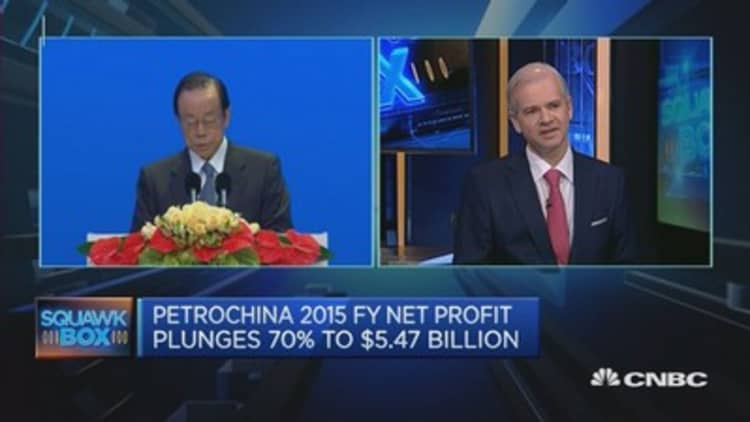
State-owned PetroChina , the mainland's biggest oil and gas producer, is "substantially overstaffed" and will need to cut jobs to stay competitive, said Bernstein's senior oil and gas analyst, Neil Beveridge on Thursday.
Beveridge's comments come on the back of the company's full-year results, announced Wednesday, which showed a 70 percent slump in its 2015 profit due to sustained low crude oil prices.
Net profit declined to 35.52 billion yuan ($5.47 billion) last year, from 107.17 billion yuan in 2014, the state-controlled company said in a filing with the Hong Kong bourse.
Although the company said it will cut capital expenditure by 5 percent to 192 billion yuan ($30 billion) this year, that may not be enough, Beveridge told CNBC's Squawk Box.
"PetroChina is not able to cut costs enough to keep profits at a high enough level," he said.
The company's low attrition rate is in contrast to internationally after oil prices' 70 percent plunge since the summer of 2014.
PetroChina still employs over half a million workers although it produces the same volume of oil as ExxonMobil, which employs just 80,000 workers, said Beveridge.
"They are not really cutting lifting cost anywhere close to what they need to be doing because they can't fire anybody; they are a state-owned company and they are expected to keep relatively full employment in the country."
Chinese officials have signalled they of layoffs in the beleaguered coal and steel industries, but have indicated the same for the oil sector. This may change soon.
"(PetroChina is) significantly overstaffed relative to what they need; they will have to cut because ultimately, they have to remain competitive."
This is particularly important as oil imports to China will rise with a fall in domestic output after capex cuts this year, he added.



